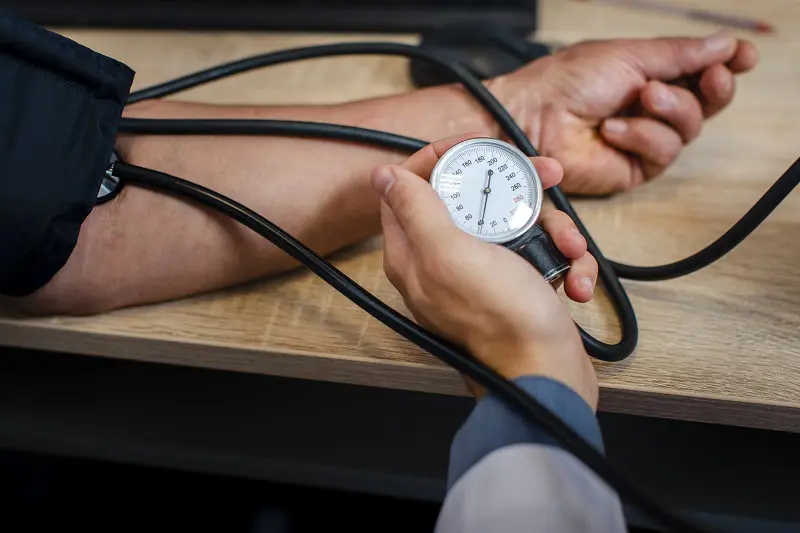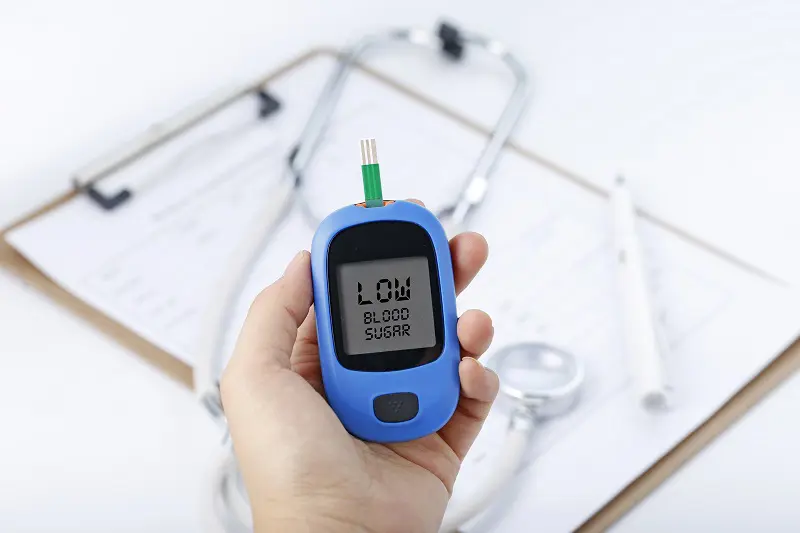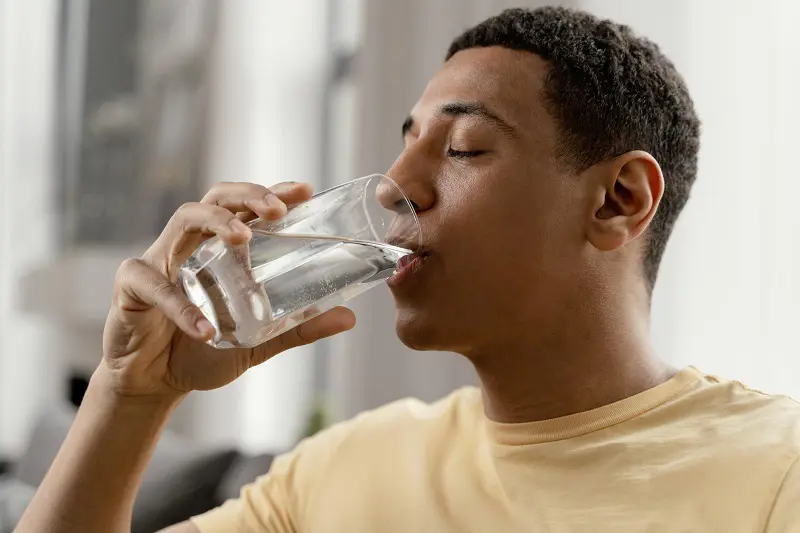What Is Water Fasting? Benefits And Risks

Water fasting involves total abstinence from food intake and drinking only water for a set period. Typically, it lasts between 24 and 72 hours and has been practiced for thousands of years.
People often try to fast with water for multiple reasons, such as weight loss, promoting autophagy, and reducing the risk of chronic health conditions. So, let’s look at the possible water fasting benefits, as well as its risks.
Possible Benefits Of Water Fasting
1. Can Lower Blood Pressure

One major potential benefit of water fasting is that it can help lower our blood pressure. A study published by the Nutrients Journal in 2022 showcased that 48 people (who were considered overweight or obese) saw a decrease in their blood pressure levels after water fasting for 10 days.
Only drinking water during hypertension (although for the short term) can be a boon to a patient’s overall health. Moreover, complement this activity with some light exercises to lower blood pressure.
2. Can Promote Autophagy

Water fasting may also promote an important process in the body known as autophagy. What does this mean? In autophagy, our old cells get broken down and recycled. They also prevent the accumulation of damaged cells - which are great risks for cancer.
A good autophagy process may be helpful in tackling various illnesses like neurodegenerative and heart disease. It also fights harmful viruses and bacteria daily, supporting overall well-being.
3. Can Improve Leptin And Insulin Sensitivity
Better sensitivity to insulin and leptin will make these hormones highly effective. Water fasting can ultimately enhance this sensitivity, promoting a better metabolic rate.
Being sensitive to insulin means the body can efficiently decrease blood sugar levels. Leptin sensitivity suggests our body could process hunger signals better, making us less likely to suffer from overweight and obesity issues.
4. Can Decrease Arthritic Symptoms

Water fasting is particularly useful for combatting two types of arthritis: rheumatoid arthritis and osteoarthritis. A good water fasting habit for short term could reduce the symptoms related to these diseases like swelling, joint pain, and muscle tightness.
One to three days of water fasting can also reduce inflammation in the body, relieving a patient from extreme pain in the joints. Fasting for a consistent period could also prevent the development of further inflammation.
5. Can Support Digestive Health

Fasting with water can actually provide the break that is sorely needed for our digestive system. This practice allows organs like the stomach and intestines to heal, rest, and ultimately reset.
A fully healed and rested digestive system helps offer plenty of benefits, improving the fight against issues like gas, constipation, indigestion, and bloating.
6. Can Enhance Urinary Health
This benefit is straightforward - the more water we drink, the better our urinary health. Staying hydrated keeps urine crystal clear, while less H2O can raise the risk of urinary tract infections and kidney stones.
A study done by the Nutrients Journal in December 2020 found that 14 middle-aged men who fasted on water for eight days experienced fewer urinary tract infections without other adverse health effects.
7. Can Manage Type 2 Diabetes

Since water fasting aids to increase our insulin sensitivity, it can be a good practice for managing chronic health conditions like Type 2 diabetes. A person who is insulin sensitive could see good regulation of their blood sugar level, preventing a diabetic situation from getting worse.
This practice is also beneficial for those individuals who have been diagnosed with prediabetes since they are at greater risk of getting diabetes.
8. Can Help Induce Ketosis
When we undergo water fasting, our body witnesses several metabolic changes. The glycogen stores would get depleted within 16 hours of fasting and this can induce a state called ketosis. In ketosis, our body starts to burn fat instead of glucose.
Ketosis can yield lots of advantages - it improves blood lipid profile and promotes brain function. It can also be fantastic for people who are looking to reduce their weight.
9. Can Offer A Healthier Skin

Due to better autophagy process, water fasting promotes healthier skin by replacing damaged / old cells with new ones. This renewal can also reflect on our skin, resulting in a smoother and clearer complexion.
Drinking plenty of water during a fast can also provide us with more elastic skin. Moreover, it should be noted that smooth and clear skin is useful for aesthetic appeal.
10. Can Get Rid Of Toxins
Since water fasting aids in detoxification, it may help flush toxins. Practicing this method for a short period could be all we need to reduce toxin levels and promote overall well-being.
Lesser toxins could mean better gut health, improved cognitive function, and lower risk of disease. So, perform this fasting once every month in order to cleanse the skin of the toxins that're accumulating in the body.
Possible Risks Of Water Fasting
1. Can Increase Dehydration Levels

This may seem weird at first, but fasting with water can actually increase risk of dehydration. Although intake of H2O keeps us hydrated, it's not truly the full story. Surprisingly, 20% to 30% of our daily water consumption comes from the food we take.
Now, when we don't consume those foods, we'll ultimately get dehydrated. This will only induce a plethora of issues, ranging from nausea to low blood pressure.
2. Can Lead To Orthostatic Hypotension
Dehydration due to water fasting could lead to a more dangerous condition called "orthostatic hypotension". This situation features a fall in blood pressure - this only makes us dizzy and light-headed.
If we experience the symptoms of orthostatic hypotension while practicing water fasting, it may imply that this is not the right method for our body.
3. Can Cause Deficiency Of Nutrients

Although conducting water fasting can be beneficial in short term, continuing this practice for longer time could result in a deficiency of nutrients, including important vitamins and minerals.
This deficiency, if left unchecked for a long time, may cause severe health issues like muscle weakness, fatigue, bleeding gums, and dry skin.
4. Can Reduce Wrong Type Of Weight

Water fasting might actually cause a reduction in the "wrong type of weight". While everyone expects to shed excess fat quickly during a water fast, it may instead target water weight, carbs, or even muscle.
This unintended weight loss can be counterproductive if the main goal of water fasting is to lose fat. That’s why water fasting should be carefully approached if we desire effective weight loss.
5. Can Promote Uric Acid Level
One major risk of water fasting is that it could increase the level of uric acid. Build-up for a long time could increase the risk of several problems, especially gout and kidney stones. People who have a history of these diseases should avoid them at all costs.
Gout may lead to cloudy urination, joint stiffness, and swelling. Kidney stones, on the other hand, can cause trouble urinating, nausea, and pain in the lower back or abdomen.
6. Can Result In Imbalance Of Salt
Drinking lots of water while fasting could decrease the sodium level in our blood. If the level becomes too low, we may suffer from hyponatremia.
When we sweat after a physical activity, we’ll lose sodium. However, water cannot replenish the lost sodium, which ultimately leads to electrolyte imbalances. So, take care not to perform high-impact activities like certain cardio exercises, HIIT, or strength training.
How To Do Water Fasting?
There is no universal protocol for water fasting, so people can practice it according to their preferences. However, the general idea for a water fasting period is 1 to 3 days. Going beyond the third day may lead to various side effects and increased risks, such as dehydration and electrolyte imbalances.
Water fasting is typically categorized into two parts: the fasting period (1 to 3 days) and the post-fast days (after 3 days).
1. Fasting Period (1 To 3 days)
Let’s start by picking the days when we can rest more. This choice helps us fast efficiently without much issues. Fasting on busy days could be risky since it may increase the chances of complications.
Now, when Day 1 starts, we should avoid all food and only go for water consumption. Some people may drink water whenever they desire, while others may opt for a particular amount - like 3 or 4 litres. It is also better to drink distilled water to maintain overall health.
Continue the momentum to Day 2 and 3. During the fasting period, totally avoid any hard physical activities. Instead, practice some breathing techniques and meditation to distract the mind and promote relaxation.
2. Post Fast Days (After 3 Days)
When we successfully finish our fasting period, it is time to start the post-fast period. During this phase, we should consume smaller meals that're packed with nutrients. Meals that are high in vitamins (A, B12, C, E, and K), minerals, protein, and good fat are needed to recover the nutrient deficiency.
Avoid processed foods and alcoholic beverages after breaking the fast. These items can further worsen our health. Once we have crossed the fourth and fifth days, then we can begin our normal diet routine.
Who Should Avoid The Water Fast?
Not everyone should practice water fasting as it features several health risks. In fact, for some, it may actually be dangerous. Here are some groups that must avoid water fasting:
1. Eating Disorder
People with a history of eating disorders should not be practicing this fasting method. It could lead to binge-eating behaviors, which are harmful to overall well-being. Disordered consumption patterns and slow metabolic rates are some symptoms of water fasting in such conditions.
2. Pregnancy
Pregnant women are already in a vulnerable phase, so they need high calories and nutrients to maintain their health. Water fasting during this period is dangerous, and it could negatively affect the baby as well. Moreover, breastfeeding moms should also avoid this practice.
3. Chronic Kidney Issues
If we suffer from chronic kidney problems, then water fast may not be a suitable practice. In fact, a water fast could make the kidney function worse. This method also has the risk of increasing uric acid, which contributes to development of kidney stones.
4. Headache And Migraine
People with uncontrolled headaches or migraines must avoid water fasting since it may increase dehydration levels, that is known to worsen these conditions.
5. Physical Labor
People with a physically demanding job should also refrain from doing it. Continuous physical activities yield lots of sweat. Although there are various benefits of sweating, during this time, it may actually harm the body by causing electrolyte imbalances.
When To Visit A Doctor?
If we have an underlying health condition, it is best to visit a doctor before trying out the water fasting method. Some health conditions may permit water fasting under strict medical supervision, while others may fully prohibit it for safety reasons.
So, if we believe that our condition isn’t severe or wouldn’t be affected by fasting, it’s still important to take professional advice. People taking medications must also exercise caution and consult their doctor before committing to a water fast.
Disclaimer: The content presented in this article is only intended to be used for information purposes. It should not be taken as a form of medical / clinical advice.
Recent posts
Fitness
Fitness
A Guide On How To Get A Six Pack And Develop Shredded Abs
Six-pack abs come from having a low body fat percentage, which makes your abdominal muscles more visible. To get them, you need a mix of factors - solid diet, regular workouts, and a consistent training routine. Building strong ab muscles takes time,...
Fitness
12 Weight Bearing Exercises To Enhance Bone Density
When practicing weight bearing exercises, your legs will support your body weight. These workouts include resistance and balance training, which help strengthen your bones and muscles. This category includes many bodyweight moves, like push-ups, squa...
Fitness
16 Compound Workout Exercises To Try At Home Or At Gym
Compound exercises form the foundation of effective muscle training. Unlike isolation workouts that focus on individual muscles, compound movements such as squats and deadlifts engage many muscle groups simultaneously, boosting total strength, power,...
Fitness
How To Do Burpee Properly For Beginners At Home
Burpee is a combination of two-part exercise, pushups followed by a leap in the air and squats. It is a challenging exercise that works many of the major muscle groups in your body. Doing multiple reps of this exercise back-to-back could be quite exh...
Fitness
12 Simple Rotator Cuff Exercises For Conditioned Shoulders
The rotator cuffs are a key muscle group, crucial for a wide range of arm movements and for stabilizing the shoulder joint. When we’re rotating or lifting our arms, the rotator cuffs are working hard. Weakness in these muscles can lead to...
Fitness
16 Remarkable Elliptical Machine Benefits For The Body
The elliptical machine offers a fantastic low-impact workout, minimizing stress on joints, and providing a full-body exercise. They are excellent for cardiovascular health, improving endurance, and burning calories efficiently. It is often one ...





